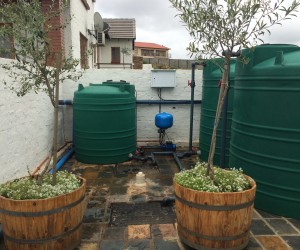Could it be that recycling the water we have is the key to water availability relief for the Cape region – as opposed to imposing increasingly stricter and potential unviable water usage restrictions as well as costly desalination? SewTreat have put forward another option – the biological treatment and recycling of waste water.
The Cape’s worst drought in a century has the region’s reservoirs and dams at record lows. The communities in the region are now at severe risk of running out of water altogether while the all-important agricultural sector has been plunged into crisis, affecting the local economy. With the latest ‘Day Zero’ restrictions set to be put into place allowing residents a mere 25 litres per day for personal use, the situation is now more dire than anyone could have predicted.
SewTreat spokesperson, Theunis Coetzer, says that these restrictions ultimately still result in water wastage. “We need to ask ourselves if whether we are restricting use to 25 litres per person per day destined to go down the drain and be gone forever. Not if we could recycle this back into clean, safe drinking water,” says Coetzer. “In the past the costs of the infrastructure required and the fact that we had cost effective water supply, prevented the technology to take root, but modular plant designs using biological treatment methods are changing the game.”
Treating sewage water and waste water for re-use is by no means a new concept but previously the methods used and the infrastructure construction needed to implement water recycling have made it a wonderful ‘green’ dream that no one could financially realise. We have also had relatively cost effective water being supplied to us. In addition to this, Coetzer explains that there has been a stigma around drinking or re-using treated and recycled sewage water. “What businesses, schools and hospitals will start to realise is that recycling water by means of natural, eco-friendly, biological treatment methods is the best and most cost effective way to ensure water availability and security – and that it is now becoming a matter of life and death.”
While the concept was unthinkable in a South African setting two years ago, it has been successfully done in numerous countries around the world for years. In 2014, three years into California’s worst drought in over a century, the state’s Orange County Water District (OCWD), established a pioneering waste water treatment facility that recycles used water – or sewage – and returns it to the drinking supply. The plant’s production expanded from 259 to 370 million litres per day which is enough for 850,000 people.
Closer to home, Windhoek has been successfully treating waste water to drinking standards for the past 50 years. Most of the waste water produced by Windhoek’s 300 000 residents is sent to the Goreangab waste treatment plant – the first stop in the city’s pioneering water recycling system. The systems and technology have more than proven themselves – and far from being repulsed by the idea of drinking recycled sewage water, the residents have no complaints and are in fact proud of what they have achieved with the plant. Many call it Africa’s origin story for water reclamation and potable reclamation, and the plant gets thousands of visitors from around the world who are keen to see where this all started way back in 1968.
Businesses, organisations, residential estates, schools, retirement homes, retail spaces, farms and communities will likely be pursuing the installation of modular, biological waste water treatment plants in the year ahead because these systems can be implemented very quickly and at an affordable price. In fact the price comparison between re-cycling used and sewage water and desalination is staggering. The cost factor is based around the highly concentrated waste (brine) and high electrical energy requirements for desalination that make it more expensive in terms of Rand per litre for the final drinkable water.
SewTreat offers specialized, modular biological waste water treatment plant designs tailor-made for the South African and African market. Their approach is based on return activated sludge technology incorporating submersed aeration media. This enhanced bacterial action ensures a highly effective treatment process boasting a very low carbon footprint, minimal capital input and low maintenance requirements.
Their product offering includes modular Fibre Glass waste water treatment plants that can be installed either above or below ground for any operation from home use to medium sized business operations. Tailor-made for homeowners and lodges, they also offer DIY plants that are cost effective and easy to install. For larger business operations and firms within the industrial sectors, Sewtreat also offers Mega and Civil Constructed waste water treatment plants.
“It is 100% possible to recycle both sewage and waste water to the point that it is safe for drinking. We are facing a major water crisis of epic proportions and it is time to recognise this process for the major contribution that it can make to water security,” Cotzer concludes.









